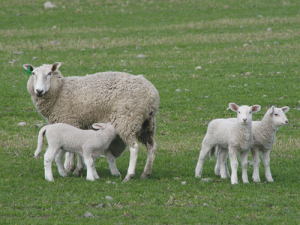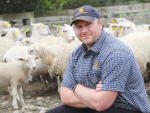For a high-yielding 80kg ewe -- dairy or with multiple lambs – to produce at least 3kgMS/day, her voluntary intake of high-energy feed must be near 3kgDM/day.
So says Sam Peterson, from the International Sheep Research Centre at Massey University.
If the target is not hit, she will enter negative energy balance (NEB) or reduce milk production, he says.
New Zealand’s traditional sheep are not likely to sustain NEB for long, he says.
“Our meat and dual purpose breeds were selected for more than half a century to produce ‘fat lambs’ for the Smithfield market in London at Christmas,” he says in a paper to the NZ Veterinary Association conference.
“Unsurprisingly in retrospect, the result was a small, early maturing sheep that produced a lot of milk for a short period and did not mobilise fat easily.
“Despite the change to selection for large, late-maturing animals, there has been no selection in our national sheep flock for persistence in milk production. Thus, our traditional sheep breeds will tend to reduce milk yield steadily after an early peak, and put on body condition during lactation even when well fed.
“Underfeeding will simply result in reduced yields in most ewes, though some will ‘milk off their back’.
“Lactating sheep, especially dairy sheep and those with multiple lambs, should be fed at ‘luxury’ levels -- offered pasture, lucerne or herb and legume mixes at over 2000kgDM/ha with residuals over 1500kg DM/ha.”
Supplementary crops with high ME content chosen to suit local soils and climate should be used to fill gaps in feed supply, he says.
“These may be fed fresh or conserved. Forages such as chicory have ME content similar to barley and maize grain, so are viable alternatives, although they will take longer to eat and digest.
“Hence, starch-based concentrates (around 300g/day but not more) should be fed to dairy ewes in the shed, both as an aid to management and as a nutritional strategy to increase ME intake.”











